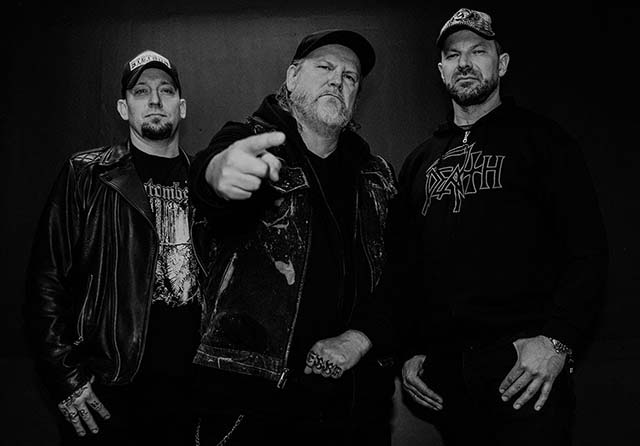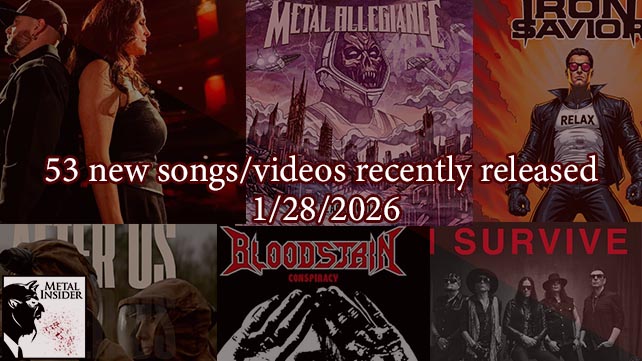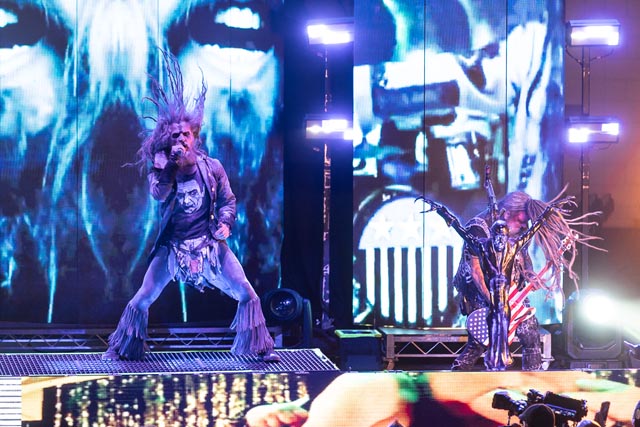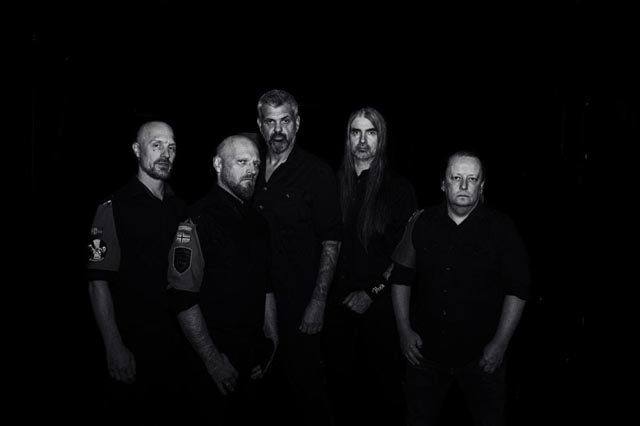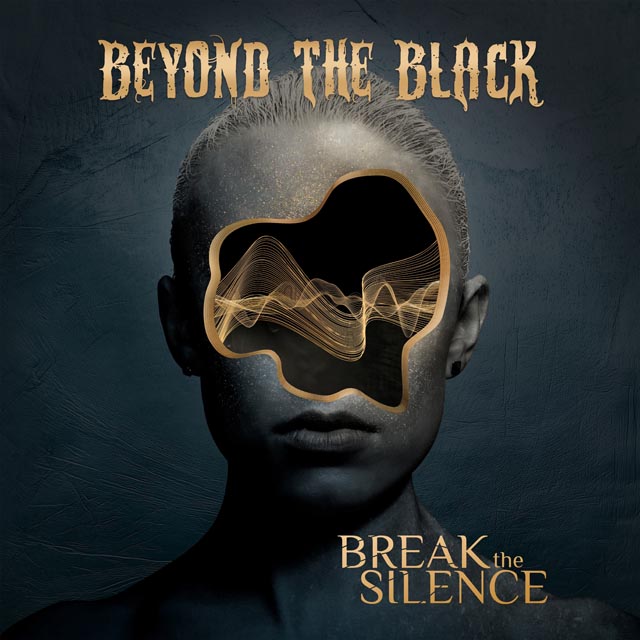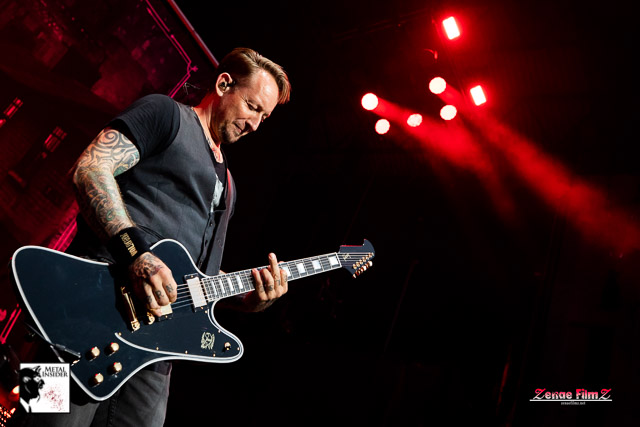
Despite the challenges faced during the COVID-19 pandemic, the music industry reached a near standstill, providing a unique period of downtime for artists. While some turned to livestream shows or experimented with Virtual Reality, others took a hiatus or even called it quits. For Michael Poulsen of Volbeat, this period became a journey back to his death metal roots from his time with Dominus, eventually reconnecting with the classic death metal music that inspired him in his teenage years. This rekindled passion led Poulsen to join Marc Grewe (Insidious Disease, Ex-Morgoth) and Morten Toft Hansen to form Asinhell. A fresh death metal project that pays homage to earlier influences and captures a raw, authentic, and harsh sound reminiscent of the old-school style. Their debut album, Impii Hora, released on September 29th via Metal Blade Records, has inevitably become one of the standout releases of 2023.
Now, nearly three months post-release, with Volbeat seeming to have a break from their touring cycle, Asinhell are gearing up for numerous festival appearances during the 2024 European Festival season. Noteworthy from this story is the success of Impii Hora, characterized by its freshness, heaviness, and authentic, classic sound. Poulsen’s journey also reinforces that revisiting earlier creative endeavors is always possible. Despite the demands of life, he encourages others not to be discouraged from reopening that creative book and working on what was once left unfinished. In a comprehensive conversation with Metal Insider, Poulsen delved into the Asinhell project, potential plans for a new Volbeat record, and the challenges of navigating the 2024 touring season. He shared insights into his original influences, highlighting the joy of returning to his earlier days and rocking out with friends in a small garage.
What led to the formation of the project?
I’ve been listening to classic heavy metal since I was ten years old, and then I discovered extreme music when I was thirteen. I believe I formed my first death metal band in 1990 or something like that. I was very young. There have been a lot of years of listening to Death Metal, and I also released some albums under the name Dominus, where we made a couple of Death Metal albums. But when I moved out of my parent’s house, I bought all the records I was listening to at my parents’ home, many ’50s tunes, the classic rockabilly stuff, and my songwriting started changing. And it was a little bit complicated to mix rockabilly or just rock music, or you can say more bluesy stuff and death metal. I’ll be hanged on the upside-down cross if I did that. So, I needed to do something else that became Volbeat. But I started listening to extreme music when I was thirteen. Discovering bands like Bathory, Kreator, Sodom, Venom, and Celtic Frost, and then quickly, Death was releasing Scream Bloody Gore, and suddenly, the whole American death metal scene was exploding with releases. At the same time, the Swedish scene was exploding; the Scandinavian scene was exploding with great bands like Carnage, Nihilist, Entombed, Dismember, Grave, and Unleashed. So, it’s been listening to and collecting old-school death metal for many years. And I never really had the time to set up a second project besides what I was doing in Volbeat, but there’s time for everything. And like so many other musicians who have to sit and wait, being able to work during the pandemic, there was suddenly time to nerd around your old collection of vinyl. I have always been listening to the extreme stuff at home, or while I was running, or in my car, but it was just nice to finally find the time, inspiration, and passion for the style again because it’s always been there.
It’s almost like a parked bicycle or moped that you just put in the garage, and you know you’ll return to it someday, but then it starts talking to you, and you tell it to keep its mouth shut. But I said I’ll get back to you, and when I did that, it felt like yesterday, and it felt good. So, it’s a nice adventure right now, that brings many memories to how we were promoting music back in the days, like tape trading, and meeting people at vinyl stores. There was no internet, so communicating was by going out and meeting people at the record stores, nerdy underground magazines, and, as I said, tape trading and exchanging flyers. At that time, there were not many releases; today, there are so many releases every week. But back in the day, in a month, there were only a few releases, so it was something special.
And I liked how things were promoted at that time; I think there was more soul in it; there was more of a hunt for what you wanted to do. Today, everything is just a click away, and it’s a totally different way of promoting yourself, I don’t find interesting. It’s just the way it is. So, there’s a lot of great memories going back to revisiting that style that I’ve been loving so much for so many years. And I just hooked up with some good old friends I’ve known for so many years, and we share the same passion and love for old-school metal. And we pretty much agree on what the band should sound like and what the inspiration will be. And on the 29th of September, our first record out on legendary Metal Blade, run by legendary Brian Slagel. So that’s something that I’m very, very proud of. So, I can’t wait to share the whole album with the people out there.
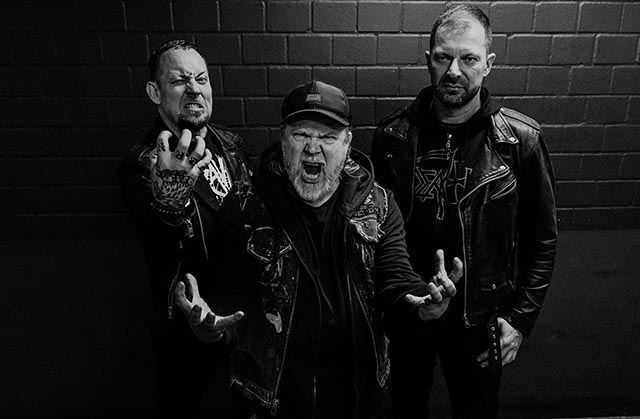
Photo Credit: Brittany Bowman
I’m used to your sound in Volbeat, so this is a nice change of pace and seeing your return to old creative passions and putting life back into it. What was the process like creating the debut album?
The process was trying to get the same spirit as how we did it when we were very young. When we were only fifteen, we had no money for anything, going into expensive rehearsal rooms with equipment and stuff like that. It was a small basement with very limited equipment; you didn’t even have any idea how it was working. So, when I was standing home with Morten Toft, the drummer of Asinhell, one of my very good friends, we just agreed that we wanted to build a project in his small garage because he had his drums there. And I said, let’s go back and not use the opportunities we have to go into really fancy rehearsal rooms where everything is too comfortable; let’s just keep it here in your garage. I’ll dig up a very old amp, and a very old guitar from back in the day, and let’s just crank it all up to 10. And then, every Friday became death metal Friday. So, we hooked up every Friday in Morten’s garage, and I was so inspired that I had a new song ready pretty much every week. And so, no PA system, not anything. When I called Marc Grewe, the mighty singer of Morgoth and now Insidious Disease, I said, “Listen, old friend, I’m ready now.” We’ve been talking about doing a death metal project for many years, bringing back the old-school death metal. And it took some time because I’ve been so extremely busy in Volbeat, and I’m still very busy in Volbeat, and Volbeat will be working on new material next year and be recording a new album next year that I’m pretty much looking forward to.
But at the same time next year, I’ll go out and play live shows with Asinhell. And Marc just said, “Great, I’m ready, just send it over. Let me hear what you guys got cooking.” And I said, “We’re not really into doing demos or anything.” “No, no, no, just push the red button on your iPhone and record it in the garage. That’s fine.” And I said, “It’s going to sound like a fucking mess.” And he said, “Yes, I know, that’s why I wanted to do it like that. That’s how we did it back in the day, just a tape recorder. But now we have our iPhones.” So, we pretty much just recorded a song from Morten’s garage every Friday, and then sent it to Marc, and he could hear what we were working on. And I’ll be doing some demo vocals just to give Marc guidance on how I was timing the vocals and stuff like that, and very quickly, he figured that out. He’s one of the best growlers, if you ask me, in that genre. So, very quickly we became that three-piece, and we recorded the whole album in Jacob Hansen’s studio within a week or something. And we were all there to record, we pretty much recorded it live, and then I dubbed some extra guitars, and Mark flew in from… Oh, he actually drove all the way from Germany, and put down his logos in the studio. Jacob Hansen ended up putting the bass down in the studio as well. So it’s pretty much recorded live in the studio. And it’s not being programmed or anything, it’s real drums, it’s real guitars, it’s everything that’s real. We wanted to have a sound that was very familiar or similar to what we grew up with in the late eighties and early nineties, and I think we managed to do that.
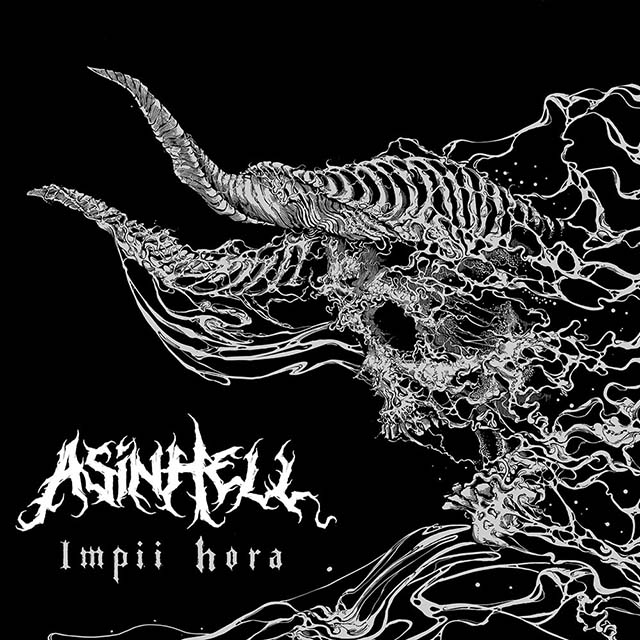
Can you discuss the songs “Desert of Doom” and “Inner Sancticide?”
When it comes to the music, “Desert of Doom,” I believe that was the third song that I wrote for the album. It definitely has a lot of Bolt Thrower influence and a lot of Death. There’s even, I’ll say some Motorhead inspiration, even though that’s not death metal. But if you’re listening closely to what Motorhead did, they were full of a lot of punkish music, and a lot of punk can also be very useful when you are playing death metal. So, it totally makes sense. “Inner Sancticide” was also one of the first, probably one of the first five songs that I wrote. Again, the influences are very in your face: Bolt Thrower, Death, Autopsy, some Grave, Entombed. Just really laid back very, very heavy and brutal in the sound. It has a really nice laid back, heavy, disgusting tempo, if you’re asking.
Between the two projects of Asinhell and Volbeat, how would you compare your approach to writing the music?
They’re two different animals; you cannot compare them. The only thing there is to that is that I’m in Volbeat, and I’m in Asinhell, and I’m the songwriter of Volbeat, and I’m the songwriter of Asinhell. But I managed to divide those two bands, one in each corner totally; they don’t have much to do with each other. Volbeat is more; it’s a rock band that combines many different styles, like metal or punk, bluesy stuff or a little bit of gospel, and pretty much everything, pop rock and such. Whereas Asinhell is straight-ahead, old-school death metal. And so, I can approach those two bands very differently, and I just jump into the death metal bubble, or coffin, if you want to put it like that, and just stay there. And when it’s time for Volbeat, that’s a different animal, where I can open up all the influences that I also grew up with as a young kid, listening to a lot of fifties music. So, it’s not really a problem for me to jump from one genre to another one because I’m very passionate about both bands and how I write, and I believe the experience that I had for so many years writing songs with Volbeat has also helped me now the way I’m writing for Asinhell. Even though Asinhell has the structure that you would find a lot of in Volbeat, there’s also a lot of room for just messing around and leaving the structure a little bit now and then. But yeah, I like the idea that you can hear two very different bands.
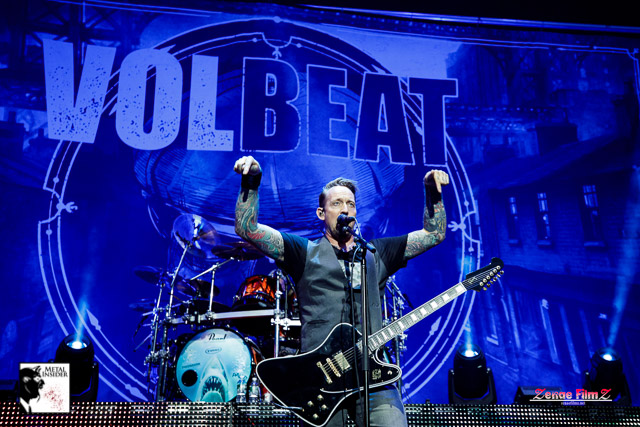
The death metal scene has evolved over the years, and how do you feel Asinhell fits into the current landscape of death metal?
I do believe that we fit quite well. The thing is, we haven’t played any live shows yet, that’s something we’re going to do next year, and we’ll probably be playing with a lot of great new bands and hopefully also some old bands. I do believe that we fit quite well, because there’s a lot of great new bands out there who are inspired by old school death metal, and I do believe that we will fit in pretty well. I believe it’s the same passion, it’s passion for extreme music. So, that’s definitely something that we can share.
You mentioned Volbeat is working on a new album; how will you work between Volbeat’s new album and probably the next touring cycle while fitting time for Asinhell?
Well, that’s something I’m about to find out now, because we are starting to look into when Asinhell are going on tour, playing shows next year. At the same time, I’m figuring out when to start writing Volbeat and when we’re going into the studio with Volbeat. That’s the big puzzle that I’m working on right now with my management, Q Prime, and our booking agency. So, at the very end, we will figure it out. Since Volbeat are not playing live shows next year, there’ll be time for going out to play live shows with Asinhell, but I still need to set some time off to be able to write Volbeat and record with Volbeat. I cannot say too much about when it will happen next year because that’s still something we’re working on.
Is there anything that you want to say or add to your listeners about what to expect from Asinhell?
Well, first of all, hopefully, people will check it out. If they love it, that’s great; if they don’t, that’s actually great, too. So, it’s a win-win situation. And the other thing is, yeah, support music, and as Chuck Schuldiner from Death said, “Let the metal flow.”


